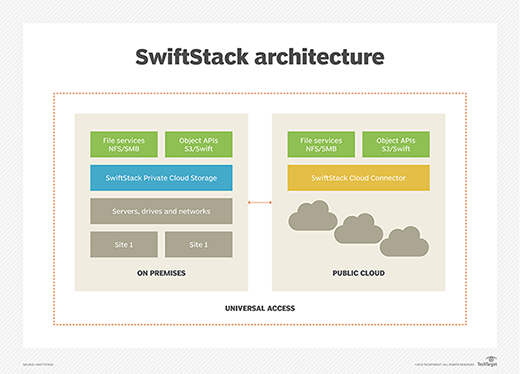SwiftStack 1space facilitates multi-cloud capabilities
SwiftStack launches single namespace for its object and file storage to ease data access, migration, management and search across private and public clouds.
SwiftStack introduced a single namespace for its object- and file-based storage software to make it easier to access, migrate and search data across private and public clouds.
The software vendor is contributing its core multi-cloud technology to a new open source project called 1space. SwiftStack 1space replaces the vendor's Cloud Sync, which enabled two-way data synchronization between on-premises private cloud storage and public cloud storage but did not include a single namespace.
SwiftStack 1space creates a single storage namespace between an on-premises object cluster and one or more public cloud sites to enable data migration while an application is running. Applications can access the data in either location through Amazon S3 and OpenStack Swift object APIs, as well as NFS and SMB file protocols.
The 1space project marks SwiftStacks' third major contribution to the open source community. SwiftStack has been a driving force behind the OpenStack Swift object storage project. The company also initiated the ProxyFS project to add native file services to Swift to support applications that can't be modified to use object APIs.
Enabling workload portability
The SwiftStack 1space single namespace enables customers to move data and applications from one site to another without changing application code. Administrators can set up the system to place data in the optimal location to facilitate compute, analysis and access to external clients and third parties, according to SwiftStack.
"The goal has been to enable workload portability so that people can move not just the data, but also move their compute applications -- whether that's analytics or Docker container applications -- and then have access to their data both on premises and in the public cloud," SwiftStack founder and President Joe Arnold said.

Many SwiftStack customers want more value from the data they've been collecting in object storage, Arnold said. Media companies often want to redistribute archived assets, such as an old movie or a baseball game, he said. One customer that does genetic screening for healthcare providers wants to perform analytics on data stored in its multipetabyte SwiftStack repository, he added.
Live data migration
Customers can use 1space to perform live data migration across sites without modifying the application to reflect any new data locations, Arnold said. SwiftStack 1space also enables cloud bursting. Customers can spin up compute resources in the cloud and get the necessary on-premises data on demand as needed, without having to move the entire data set to the cloud.
SwiftStack 1space runs on premises in SwiftStack cluster nodes, said Erik Pounds, the vendor's vice president of marketing. Customers also can run SwiftStack Cloud Connector 1space as a container in the public cloud to enable public cloud-based applications to access the on-premises data as part of the single namespace.
Users and developers don't need to use an FTP client or other tools and scripts to copy data or execute commands, Arnold said. Customers configure the storage locations they want to join to the single namespace, provide the credentials for any public cloud accounts and indicate any data management strategies they want to execute.
"Cloud adoption isn't perfect, and one of the challenges of building a hybrid cloud strategy is to maintain visibility and control over data that may span multiple storage environments," Steven Hill, senior analyst at 451 Research, wrote in an email. "A storage environment with a single namespace can be a powerful tool when it comes to effectively managing data that needs to exist in multiple locations."
Support for OpenStack Swift 2.18
SwiftStack's latest software update includes new features in the 2.18 release of OpenStack Swift object storage. Key new capabilities in open source Swift include direct integration of the Amazon S3 API, a capability that SwiftStack already provided to customers, and "deep buckets" that can store an unlimited number of objects.
SwiftStack object storage software runs on Linux. The product's controller enables multi-cloud data management in addition to private cloud storage management. SwiftStack Client software recently added metadata search capabilities through the open source MetaSync project that the vendor leads.
Marc Staimer, president of Dragon Slayer Consulting, said metadata search capabilities are important for workflow collaboration, research and analytics, and many other vendors offer them. SwiftStack's competition includes Caringo, Cloudian, Hitachi Content Platform, IBM Cloud Object Storage, Red Hat's and SUSE's Ceph distributions, Scality and Western Digital's ActiveScale, Staimer said.
Randy Kerns, senior strategist and analyst at Evaluator Group, said SwiftStack's original OpenStack Swift focus limited the vendor to specific markets, but the S3 API integration will give it more opportunity.
SwiftStack sells its object storage software through a subscription-based license determined by the amount of data under management. Pounds said customers formerly paid the same price, no matter where the data lived, but the price will now be lower for data under management in a public cloud. The base SwiftStack license includes 150 TB of private cloud data and 10 TB of public cloud data. Pounds declined to disclose pricing.






